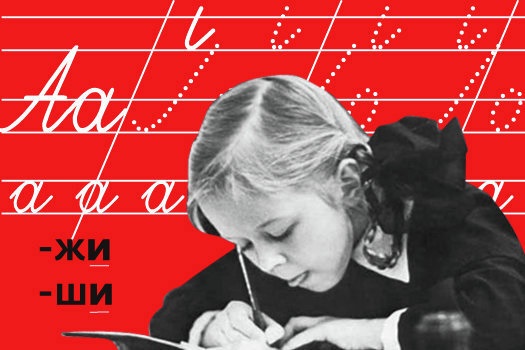
Russia’s Ministry of Education and Science is yet to conduct an in-depth analysis of the results of the Unified State Exam (USE), including the exam on the Russian language. However it’s already clear now that there are individual schools and whole regions which could not for objective and subjective reasons ensure quality teaching of this subject to their students, said Minister Dmitry Livanov at the second session of the Russian Language Council under the Russian Government.
The session was chaired by Deputy Prime Minister Olga Golodets. She paid attention to the success achieved in the conduct and organization of USE-2014. “We can be assured that for the first time in the history of Unified State Exam it was taken honestly,” underlined Golodets. At the same time she mentioned that a number of problems were revealed.
The results expanded the list of RF provinces where the level of teaching Russian is not at the proper level: at present there are now 11 such regions. According to Olga Golodets, the government has already tasked the Ministry of Education and Science to prepare a target program of teaching Russian, which first and foremost must be implemented for the subjects in need of more care and assistance from the federal center.
In the course of her report the chair of the council also discussed Russian language promotion and development of remote education as part of these studies. She noted the need to facilitate access to tuition programs and courses of Russian and creating platforms for studying this subject. “Thus we can during three years increase the number of those who learn Russian by a million people,” Golodets said.
Russian Minister of Education and Science Dmitry Livanov in his address elaborated on the course of proceeding with the main directions and mechanisms of Russian language promotion in 2014. He informed that his department will yet to thoroughly review the USE results, including on Russian. However it is already clear now that there are both individual schools and entire regions which failed to provide quality teaching of the given subject for their students both for objective and subjective reasons.
“Schoolchildren and their parents must be confident that the quality of Russian studies in any particular school complies with the education standard and all requirements,” the minister emphasized. The system of exams must also undergo some changes in the future, in the opinion of the departmental head: in 2015 they plan to introduce the composition among the final examinations.
Dmitry Livanov focused on a range of measures towards better organization of Russian language tuition process for those kids who are not native speakers of this language. This specifically regards preschool kids who do not attend daycares.
The minister also enlarged upon the large-scale work aimed at Russian language preservation and promotion: the global action Total Dictation, in which 64,000 volunteers participated, the events dated to the celebration of the Russian Language Day as well as a multitude of youth events conducted under the aegis of Russian language and literature.
During his address Chairman of the State Duma Committee for Education Vyacheslav Nikonov also dwelled on promoting the Russian language abroad, the activities carried out in this direction and emerging difficulties. He underscored that it is necessary to step up the efforts aimed at the inclusion of Russian in the national educational programs overseas.
Chair of the Board of Trustees of the Russkiy Mir Foundation and President of the Russian Education Academy Lyudmila Verbitskaya spoke the participants of the session about organizations engaged in preservation and support of the Russian language both in Russia and beyond. One of the outstanding case studies is the International Association of Russian Language and Literature Teachers, which during the past half year has conducted 11 research and hands-on events in different countries. She also noted the contribution of the Russian Society of Russian Language and Literature Teachers to the efforts towards the native language preservation.
Based on the results of the session at the Ministry of Education it was decided that work towards the implementation of the plan “The Main Directions and Mechanisms of Russian Language Promotion for 2014” should be carried forward and proposals should be prepared, in collaboration with the RF Ministry of Culture, on harnessing the potential of international relations, educational tourism and information resources in culture and for promoting open education.
Council members include Education Minister Dmitry Livanov, First Vice Minister of Culture Vladimir Aristarkhov, Chairman of the State Duma Committee for Education Vyacheslav Nikonov, Vice Minister of Education Veniamin Kaganov, Vice Minister of Foreign Affairs Gennady Gatilov, Deputy Head of Rossotrudnichestvo Larisa Yefremova, Chair of the Board of Trustees for Russkiy Mir Foundation and President of the International Association of Russian Language and Literature Teachers, Lyudmila Verbitskaya. Director of the Department for State Policy in Child and Youth Guidance under the Ministry of Education and Science, Alexander Stradze, serves as Secretary-General of the Council.
Source: Uchitelskaya Gazeta

 Russia’s Ministry of Education and Science is yet to conduct an in-depth analysis of the results of the Unified State Exam (USE), including the exam on the Russian language. However it’s already clear now that there are individual schools and whole regions which could not for objective and subjective reasons ensure quality teaching of this subject to their students, said Minister Dmitry Livanov at the second session of the Russian Language Council under the Russian Government.
Russia’s Ministry of Education and Science is yet to conduct an in-depth analysis of the results of the Unified State Exam (USE), including the exam on the Russian language. However it’s already clear now that there are individual schools and whole regions which could not for objective and subjective reasons ensure quality teaching of this subject to their students, said Minister Dmitry Livanov at the second session of the Russian Language Council under the Russian Government.





